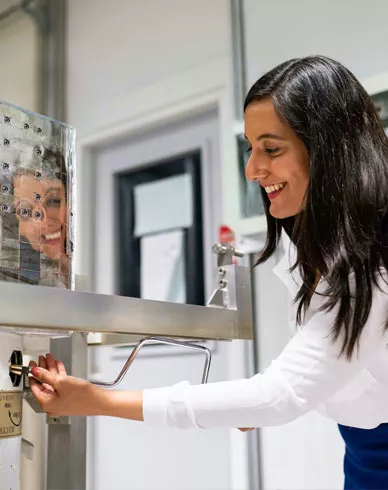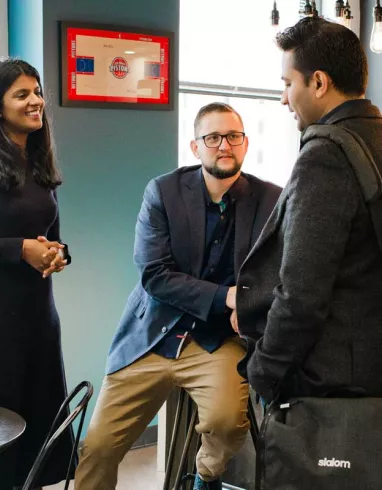Rediscovering personal history

Each of us is the sum of our experiences — from our earliest impressions to the moments we can recall with perfect sensory detail. I’ve often wondered whether our childhood experiences shape us most of all, even though we’re least likely to remember them.
Recently, as part of my professional development, I was asked to consider my own core values and purpose and why I hold them so deeply. I thought the answers might lie with my family. So, on a recent trip home, I decided to ask my parents about their own experiences. While I had heard many of their anecdotes before, this time I would listen with a deeper purpose. Their stories, I found, fascinated me.
I was raised in a small village in India, the youngest of seven children born to two hardworking teachers. My parents, especially my dad, are not known to have deep emotional conversations, so I had to work up my courage and prepare my questions. (I also had a secret weapon: I enlisted my very charming, very disarming niece to be my co-interviewer.) I wanted to know what was happening in the world when they were growing up, which personal experiences had impacted them most, whether they’d had any regrets in life, and what kind of relationships they’d had with their own parents. My goal in talking to them, of course, was really to find myself: What was behind my nagging imposter syndrome? What gave me my strength and perseverance?
Through our conversations, I learned more fully what it was like for my parents to raise seven kids. They didn’t have the time or luxury to cultivate big hopes and dreams for us or themselves. Instead, they had a singular goal — to give each of us a comfortable path to a career and financial independence. They worked toward that goal day after day with deep nurturing, care, and attention. It’s no wonder my siblings and I are pretty adaptable.
As an educator, my dad always said his greatest wealth was not monetary, but rather the respect he earned by having a positive impact on others. As the patriarch, he was dedicated to building a bright future for his children by giving us the best education and opportunities within his limited means. For example, when I was studying for my engineering exams, my dad took three months off to sit with me every day to prepare.
I’m eternally grateful for my dad’s sacrifices. At the same time, I now recognize that while his devotion and advocacy helped each of us realize our individual path to success, it created a propensity to look to those in positions of authority for support, rather than embracing our own strengths and intuition. Throughout my career, I’ve intentionally worked against that tendency by cultivating a sense of independence and self-trust in order to lead others.

I also learned how strict my grandfather was. Even after my dad was a father in his own right, my grandfather would routinely give him a piece of his mind — and per the cultural norm, my dad would keep quiet. My dad then adopted a similar parenting style, which is where my siblings and I learned our almost unhealthy respect for authority.
While my ‘aha’ moments are too many to list, here are the three insights I most want to share:
- By tracing what shapes us, we can become more self-aware.
Over time, through life experiences and perhaps more formal exercises, many of us develop a sense of our key strengths and values. Knowing that you are highly empathetic and adaptable, for example, can influence the roles you take on or how you approach problems. But using your foundational experiences to understand what makes you who you are can unlock greater conviction and allow you to be more authentically yourself. - It is within us to change anything we want about ourselves.
Looking back at my upbringing, I marvel at just how much I have changed and grown. Developing the skills to recognize the things I want to change and making progress toward those goals has been incredibly empowering. Acknowledging that progress gives me great pride as well as the courage to work on other things. We’re not fixed, we’re always evolving — and that knowledge is truly liberating. - We can’t ever express enough gratitude for our parents and mentors.
The people who raise us and contribute to our early growth shape us in ways that influence the rest of our lives. The more recognition and gratitude we cultivate for the people who had the biggest impacts on our lives, the more we can embrace ourselves as we are and confidently take steps to become who we want to be.
So — now that I have these new insights, what’s next? I’ve realized that this self-exploration doesn’t necessarily need to lead to a particular problem-solve or roadmap for personal transformation. Understanding the forces that shape us is part of a lifelong journey of deeper self-awareness that results in subtle shifts in a few key areas. Those shifts allow us to stand more firmly in our convictions and make room for even more revelations.
I invite you to enjoy a poem that sums up this experience for me — Working Together by David Whyte — and then try this process of self-exploration for yourself. Sit down with the influential people in your life and ask deeper questions about the experiences that shaped them and you. Rather than seeking a particular answer, let it be a conversation. Follow your curiosity and seek authenticity. At the very least, you’ll have a meaningful conversation with the people you love.
This blog post was originally published here.



